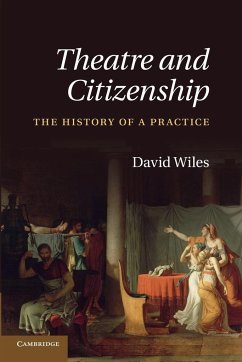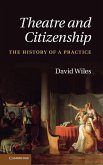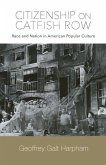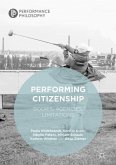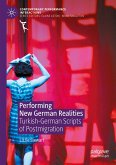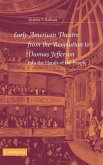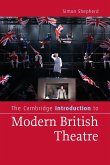- Broschiertes Buch
- Merkliste
- Auf die Merkliste
- Bewerten Bewerten
- Teilen
- Produkt teilen
- Produkterinnerung
- Produkterinnerung
Shaped by political concerns of today, this is an informed but provocative take on theatre history and theatre's social function.
Andere Kunden interessierten sich auch für
![Theatre and Citizenship Theatre and Citizenship]() David WilesTheatre and Citizenship104,99 €
David WilesTheatre and Citizenship104,99 €![Citizenship on Catfish Row Citizenship on Catfish Row]() Geoffrey Galt HarphamCitizenship on Catfish Row108,99 €
Geoffrey Galt HarphamCitizenship on Catfish Row108,99 €![Performing New German Realities Performing New German Realities]() Lizzie StewartPerforming New German Realities85,99 €
Lizzie StewartPerforming New German Realities85,99 €![Performing Citizenship Performing Citizenship]() Performing Citizenship22,99 €
Performing Citizenship22,99 €![Performing New German Realities Performing New German Realities]() Lizzie StewartPerforming New German Realities89,99 €
Lizzie StewartPerforming New German Realities89,99 €![Early American Theatre from the Revolution to Thomas Jefferson Early American Theatre from the Revolution to Thomas Jefferson]() Heather NathansEarly American Theatre from the Revolution to Thomas Jefferson144,99 €
Heather NathansEarly American Theatre from the Revolution to Thomas Jefferson144,99 €![The Cambridge Introduction to Modern British Theatre The Cambridge Introduction to Modern British Theatre]() Simon ShepherdThe Cambridge Introduction to Modern British Theatre42,99 €
Simon ShepherdThe Cambridge Introduction to Modern British Theatre42,99 €-
-
-
Shaped by political concerns of today, this is an informed but provocative take on theatre history and theatre's social function.
Hinweis: Dieser Artikel kann nur an eine deutsche Lieferadresse ausgeliefert werden.
Hinweis: Dieser Artikel kann nur an eine deutsche Lieferadresse ausgeliefert werden.
Produktdetails
- Produktdetails
- Verlag: Cambridge University Press
- Seitenzahl: 268
- Erscheinungstermin: 10. Februar 2014
- Englisch
- Abmessung: 229mm x 152mm x 15mm
- Gewicht: 393g
- ISBN-13: 9781107428065
- ISBN-10: 1107428068
- Artikelnr.: 41121550
- Herstellerkennzeichnung
- Libri GmbH
- Europaallee 1
- 36244 Bad Hersfeld
- gpsr@libri.de
- Verlag: Cambridge University Press
- Seitenzahl: 268
- Erscheinungstermin: 10. Februar 2014
- Englisch
- Abmessung: 229mm x 152mm x 15mm
- Gewicht: 393g
- ISBN-13: 9781107428065
- ISBN-10: 1107428068
- Artikelnr.: 41121550
- Herstellerkennzeichnung
- Libri GmbH
- Europaallee 1
- 36244 Bad Hersfeld
- gpsr@libri.de
David Wiles is Professor of Theatre at Royal Holloway, University of London. He has published extensively in the fields of classical and Elizabethan theatre, and his Short History of Western Performance Space was published by Cambridge University Press in 2003. This is his ninth book, and previous books have been shortlisted for the Criticos, Society for Theatre Research and Runciman prizes. He was a contributor to the Oxford Illustrated History of Theatre (1995) and is currently, with Christine Dymkowski, editing The Cambridge Companion to Theatre History. The focus of his teaching and research has always been the relation of theatre to society, particularly in respect of festival, and the present book builds on the breadth of his intellectual interests. Its genesis lies in a keynote lecture which he was invited to give to the International Federation for Theatre Research at the University of Maryland in 2005.
1. Introduction: citizenship and theatre; 2. Athens: democracy and chorality
The Frogs
Plato and Aristotle; 3. Florence, Rome and Machiavelli: Machiavelli's political works
Cicero
Terence's Andria
The Mandrake and the Society of the Trowel
'The Sunflower' in a politician's garden
coda: Goldoni, Ayckbourn and the comic genre; 4. From Coventry to London: Christian fraternity
the Weavers' Pageant in Coventry
Elizabethan London: Shakespeare and Heywood
John Milton and revolutionary tragedy; 5. Geneva: Rousseau versus Voltaire: Geneva
Rousseau
The Letter to d'Alembert
the battle for a public theatre
conclusion: two ideals; 6. Paris and the French Revolution: Brutus and the active citizen audience
tragedy as a school for citizens: the career of M. J. Chénier
the revolutionary festival
Diderot and bourgeois realism; 7. The people, the folk, and the modern public sphere: collectivism in pre
war Germany
the Indian People's Theatre Association
in search of the public sphere; Epilogue: Washington's monuments to citizenship.
The Frogs
Plato and Aristotle; 3. Florence, Rome and Machiavelli: Machiavelli's political works
Cicero
Terence's Andria
The Mandrake and the Society of the Trowel
'The Sunflower' in a politician's garden
coda: Goldoni, Ayckbourn and the comic genre; 4. From Coventry to London: Christian fraternity
the Weavers' Pageant in Coventry
Elizabethan London: Shakespeare and Heywood
John Milton and revolutionary tragedy; 5. Geneva: Rousseau versus Voltaire: Geneva
Rousseau
The Letter to d'Alembert
the battle for a public theatre
conclusion: two ideals; 6. Paris and the French Revolution: Brutus and the active citizen audience
tragedy as a school for citizens: the career of M. J. Chénier
the revolutionary festival
Diderot and bourgeois realism; 7. The people, the folk, and the modern public sphere: collectivism in pre
war Germany
the Indian People's Theatre Association
in search of the public sphere; Epilogue: Washington's monuments to citizenship.
1. Introduction: citizenship and theatre; 2. Athens: democracy and chorality
The Frogs
Plato and Aristotle; 3. Florence, Rome and Machiavelli: Machiavelli's political works
Cicero
Terence's Andria
The Mandrake and the Society of the Trowel
'The Sunflower' in a politician's garden
coda: Goldoni, Ayckbourn and the comic genre; 4. From Coventry to London: Christian fraternity
the Weavers' Pageant in Coventry
Elizabethan London: Shakespeare and Heywood
John Milton and revolutionary tragedy; 5. Geneva: Rousseau versus Voltaire: Geneva
Rousseau
The Letter to d'Alembert
the battle for a public theatre
conclusion: two ideals; 6. Paris and the French Revolution: Brutus and the active citizen audience
tragedy as a school for citizens: the career of M. J. Chénier
the revolutionary festival
Diderot and bourgeois realism; 7. The people, the folk, and the modern public sphere: collectivism in pre
war Germany
the Indian People's Theatre Association
in search of the public sphere; Epilogue: Washington's monuments to citizenship.
The Frogs
Plato and Aristotle; 3. Florence, Rome and Machiavelli: Machiavelli's political works
Cicero
Terence's Andria
The Mandrake and the Society of the Trowel
'The Sunflower' in a politician's garden
coda: Goldoni, Ayckbourn and the comic genre; 4. From Coventry to London: Christian fraternity
the Weavers' Pageant in Coventry
Elizabethan London: Shakespeare and Heywood
John Milton and revolutionary tragedy; 5. Geneva: Rousseau versus Voltaire: Geneva
Rousseau
The Letter to d'Alembert
the battle for a public theatre
conclusion: two ideals; 6. Paris and the French Revolution: Brutus and the active citizen audience
tragedy as a school for citizens: the career of M. J. Chénier
the revolutionary festival
Diderot and bourgeois realism; 7. The people, the folk, and the modern public sphere: collectivism in pre
war Germany
the Indian People's Theatre Association
in search of the public sphere; Epilogue: Washington's monuments to citizenship.

